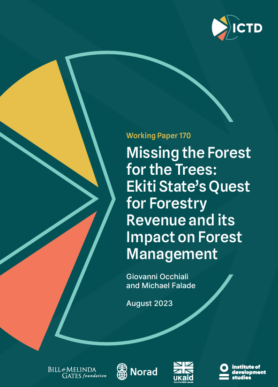Working Paper 170
Forests are important socio-economic assets in many low-income countries. However, they are often over-exploited as governments do not sufficiently valorise them, including by taxing them inefficiently. This is the case across Nigeria, where forest management and taxation has been effectively decentralised from the federal government to individual states. In this paper we assess the current forestry tax regime in Ekiti State, one of the eight Nigerian states where forests represent more than 50 per cent of land area, and where forest revenue has been historically relevant. Based on 16 interviews with government state officials, forest officers and actors from the industry, as well as data from the Forestry Commission, our analysis suggests that the ongoing depletion of forest resources in the state seems to be partially connected to an excessive focus on their capacity to generate revenue. The conceptualisation of the Ekiti State Forestry Commission as a revenue-raising agency rather than a management one, a continuous drive to extract revenue from the sector through outdated tax rates, and a view of the industry potential disconnected from the existing stock, all perversely led to a lower contribution from forestry to the state budget. While there is potential to reform both the structure of forestry taxes and their method of administration, evidence from our interviews suggests that priority should be given to enforcing a ban on forest exploitation for a period that is long enough to allow for its regrowth, at least in government reserves. This will require substantial sensitisation and engagement with actors in the sector, as well as increasing the monitoring capacity of the Forestry Commission. The Forestry Commission does not currently have enough staff to guarantee the enforcement of existing legislation, let alone a ban on all forest activities.

